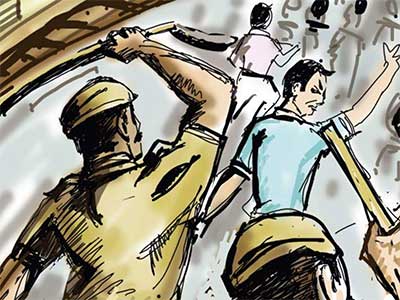Relevance: GS-2: Important aspects of governance, transparency and accountability, e-governance- applications, models, successes, limitations, and potential; citizen’s charters, transparency & accountability and institutional and other measures
Key Phrases: Justice vs Sirpurkar Commission, Justice Anita Jha Commission, Self-Defense, all means necessary, Extra-Judicial Killing, UN Convention Against Torture, UNHRC, State-Sponsored Terrorism
Why in News?
- The recently conducted Justice VS Sirpurkar commission report has indicted 10 Hyderabad policemen for firing without provocation on four men accused of gang-raping and murdering a young veterinarian in November 2019.
- The Supreme Court-appointed commission has concluded that there are sufficient grounds to believe “that the accused were deliberately fired upon with the intent to cause their death”
- The commission has asked that the police personnel be tried for “murder, causing disappearance of evidence, and providing false information”.
Reasons for Police Brutalities:
- In 1997, the National Human Rights Commission prescribed a
set of procedures to be followed by the police “in cases where death is
caused in encounters by them”.
- However, by all accounts, these SOPs are rarely implemented despite the judiciary's prodding on more than one occasion.
- In 2014, while issuing another set of guidelines to investigate extra-judicial killings, the SC pointed out that such killings “affect the credibility of the rule of law and the administration of the criminal justice system”.
- The problem is also that despite several probe panels incriminating policemen for extra-judicial deaths, cases fall through the cracks of the legal system or because of want of evidence.
- A 2015 report by the Justice Anita Jha Commission constituted by the Chhattisgarh government had incriminated two policemen for killing a minor tribal girl four years earlier.
Laws Dealing with Police Brutalities:
- The police force has the right to injure or kill the criminal, for the sole and only purpose of self-defense or where it is imminently necessary for the maintenance of peace and order.
- Under IPC Section-96 (Indian Penal Code), every human being has the right to private defense which is a natural and an inherent right.
- The CrPC Section 46 (Criminal Procedure Code) allows police officials to use ‘all means necessary to arrest a detainee. The use of excessive force than actually required may cause death.
- There is an Armed Forces (Special Powers) Act, which gives the
Indian Defense Force broad powers to use lethal force in a variety of
situations.
- It fails to provide safeguards in the event of excessive use of such powers, resulting in varied accounts of violations committed in areas where AFSPA is applied.
Important Judgements on Encounter Killings:
- R.S. Sodhi v. State of U.P 1992:
- In 1992 the Supreme Court condemned extrajudicial killings of alleged criminals by police officers and investigations into such killings in U.P. were entrusted by the Supreme Court to the Central Bureau of Investigation to bring in credibility and independence to the process.
- Prakash Kadam v. RamPrasad Vishwa Gupta 2011:
- Supreme Court in this case said that when an extrajudicial execution is proved against policemen in a trial, they must be given the death sentence.
- Om Prakash v. State of Jharkhand 2012:
- Supreme Court in this case held that the extrajudicial killings are not legal under our criminal justice administration system and equated it to state-sponsored terrorism. It also stated that accused person must be put on trial for which it puts a duty on the police not to kill the person but to arrest him.
- Parkash Singh v. State of Punjab:
- Supreme Court in this case clearly stated that no prior sanction of the competent authority for initiating proceedings is required where the act has been carried out for personal benefits.
- PUCL v. State of Maharashtra & Ors. 2014:
- Supreme Court reiterated that killings in the encounters by police affect the credibility of the rule of law and the administration of the criminal justice system.
- The Supreme Court also issued 16-point guidelines which include preserving pieces of evidence, registering FIR without any delay, video graphing the post-mortem, independent investigation, conducting a magisterial enquiry, and ensuring an expeditious conclusion of a trial.
International Laws:
- UN Convention Against Torture
- It must be noted that India has been heavily criticized for not ratifying the UN Convention against Torture and Other Cruel, Inhuman or Degrading Treatment or Punishment (UNCAT) of 1987 despite being the World’s largest democracy.
- The main concern is the violation of rights and lack of transparency as overstepping on the function of the judiciary is fatal.
- International Covenant on Civil and Political Rights
- Article-6 of the International Covenant on Civil and Political Rights, to which India is a party, states that “every human being has the inherent right to life and this right shall be protected by law. No one shall be arbitrarily deprived of his life.”
Conclusion:
- It's incumbent on all parties to ensure that due processes are followed rigorously.
- In a broader perspective, there is a need for a complete overhaul of the criminal justice system to rebuild its lost credibility and fast track procedure.
- Also the media should avoid labelling extrajudicial killings as heroic acts as it shakes the faith of people in our criminal justice system.
- The gruesome crime committed against the Hyderabad veterinarian requires a proper legal closure, not brutish illegality.
Sources: Indian Express
Mains Question:
Q. Recently V.S. Sirpurkar Commission was seen in news. In this context discuss the reasons for the Police brutalities and laws related to it, support your answer with the important landmark judgements and international laws?







